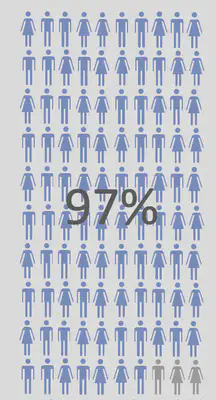Evaluating scientific consensus on climate change
What is the boost?
Simple communication about the scientific consensus that climate change is human-caused —for instance, “97% of climate scientists have concluded that human-caused climate change is happening”—increases public acceptance of the consensus, and in turn public support for climate action.
Which challenges does the boost tackle?
Political ideology shapes attitudes towards climate change, and in turn, climate policy support. Communicating the scientific consensus about human-caused climate change can alleviate the influence of political ideology, and in turn, increases climate policy support. However, it is important to understand where the scientific consensus comes from.
How does it work?
A statement describing scientific consensus, such as a simple text or graph, is shown below. Such statements help individuals to evaluate climate evidence.
Some researchers suggested to embedd this communication into a two-step procedure: First, target audiences learn how scientific consensus is reached and why it is useful for evaluating the truth of a scientific claim.
They are guided through how consensus develops in a scientific community, and three steps for evaluating whether a claim is true by evaluating scientific consensus; namely
- looking for a statement indicating consensus. Such a statement could take different forms, such as verbal, graphical or numerical.

Illustration: 97% of climate scientists have concluded that human-caused climate change is happening. - checking the source making the consensus statement
- evaluating the expertise of the consensus
Which competences does the boost foster?
Communicating strategies for evaluating scientific consensus as well as the scientific consensus itself targets people’s ability to evaluate the quality of scientific evidence, and therefore to also recognize unrepresentative experts in science communication.
What is the evidence behind it?
People may use social rules of thumb for making health or environmental decisions, such as following influential others (Nolan, 2021; van der Linden & Lewandowsky, 2022), or trusting experts.
Communicating the scientific consensus about climate change increases personal acceptance of the reality of climate change and that it is caused by humans; it also increases worry, and in turn public support of climate action. Views of participants with different political orientations converged towards the scientific consensus. Across 43 studies, this was also confirmed in other domains, such as genetically modified food, or vaccination.
A recent study showed at the same time, that a two-step boost worked well for communicating about genetically modified food, but less so with statements about human-caused climate change, when those were presented to climate-sceptic US participants who may have low trust into scientists. This requires further research with different, and larger samples.
Key reference
- Cook, J., Oreskes, N., Doran, P. T., Anderegg, W. R. L., Verheggen, B., Maibach, E. W., Carlton, J. S., Lewandowsky, S., Skuce, A. G., & Sarah, A. (2016). Consensus on consensus: A synthesis of consensus estimates on human-caused global warming. Environmental Research Letters, 11(4), Article 048002. https://doi.org/10.1088/1748-9326/11/4/048002
- van der Linden, S. (2021). The Gateway Belief Model (GBM): A review and research agenda for communicating the scientific consensus on climate change. Current Opinion in Psychology, 42, 7–12. https://doi.org/10.1016/j.copsyc.2021.01.005
- van der Linden, S. L., Leiserowitz, A. A., Feinberg, G. D., & Maibach, E. W. (2014). How to communicate the scientific consensus on climate change: Plain facts, pie charts or metaphors? Climatic Change, 126(1–2), 255–262. https://doi.org/10.1007/s10584-014-1190-4
- van Stekelenburg, A., Schaap, G., Veling, H., van ’t Riet, J., & Buijzen, M. (2022). Scientific-consensus communication about contested science: A preregistered meta-analysis. Psychological Science, 33(12), 1989–2008. https://doi.org/10.1177/09567976221083219
- van Stekelenburg, A., Schaap, G., Veling, H., & Buijzen, M. (2021). Boosting understanding and identification of scientific consensus can help to correct false beliefs. Psychological Science, 32(10), 1549–1565. https://doi.org/10.1177/09567976211007788